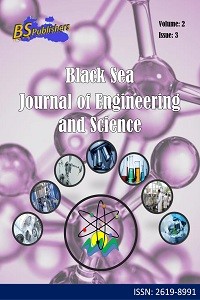Araştırma Makalesi
Yıl 2019,
Cilt: 2 Sayı: 3, 88 - 91, 01.07.2019
Öz
Kaynakça
- Anonymous, 2000. Environmental law and related legislation. lebib yalkin publications. Vol. III/1 and Vol. III/2, Istanbul, Turkey.
- Anonymous, 2001. Avrupa Birliği’nin çevre politikası ve Türkiye’nin uyumu. İktisadi Kalkınma Vakfı Yayınları, İstanbul, Türkiye.
- Anonymous, 2019. https://econation.co.nz/waste-and-pollution/ (access date: 20 May 2019).
- Atabarut T. 2000. Stages of the solid waste management in Turkey. In Proceedings of the Symposium on the History of Environment in Turkey, Turkish History Foundation, Istanbul, Turkey, p. 119-129.
- Curi K, Atabarut T. et al., 1992. Pollution of the Mediterranean Coasts of Turkey by solid wastes, WHO ICP/CEH047, Boğaziçi University, Istanbul, Turkey.
- Döberl G, Huber R, Brunner PH, Eder M, Pierrard R, Schönback W, Frühwirth W, Hutterer H. 2002. Long-term assessment of waste management options – a new, integrated and goal-oriented approach. Waste Manage Res, 20(4): 311-327.
- Guerrero LA, Maas G, Hogland W. 2013. Solid waste management challenges for cities in developing countries. Waste Manage, 33(1): 220-232.
- Kızılboğa R, Batal S. 2012. The roles and importance of local governments in the solution of environmental problems in Turkey. Mustafa Kemal Univ J Soc Sci Institute, 20(9): 191-212.
- Tırınk S and Turan NG. 2017. Current situation and challenges of municipal solid waste management in Turkey. Internatıonal Symposıum on Ecology and Environmental Problems (ISEEP) Çanakkale, Turkey.
- Turan NG, Coruh S, Akdemir A, Ergun ON. 2009. Municipal solid waste management strategies in Turkey. Waste Manage, 29(1): 465–469.
- Vidanaarachchi CK, Yuen STS, Pilapitiya S. 2006. Municipal solid waste management in the Southern Province of Sri Lan a: problems, issues and challenges. J Waste Manage, 26(8): 920-930.
Yıl 2019,
Cilt: 2 Sayı: 3, 88 - 91, 01.07.2019
Öz
In the world, where human population exceeds 6 billion, industrialization process has been spreading in developing countries and it has caused a great increase in the amount of waste. Development levels of world countries are the significant impact to determine the amount and formation of solid wastes. The first legal regulations on the collection and evaluation of solid wastes in Turkey were entered into force in 1930. Turkey had 3140 municipalities in 2002. While 2977 (92%) of these municipalities were giving solid waste collection service, only 12 municipalities had disposal facilities according to the regulations. There were 12 regular storage and 4 composting facilities belonging to these municipalities. Basic policy in waste management in Turkey is the waste minimization, recycling and final disposal. In the case of pollution/contamination, authorities are responsible for taking required measures to prevent contamination and polluting individuals are obliged to stop pollution, take measures to reduce or eliminate its effects. This study presents a brief history of the legislative trends in Turkey for Municipality solid waste (MSW) management. In addition, submits the MSW responsibility and management structure along with the current production, composition, recycling, and treatment. The legislative system that will provide legal, administrative and technical guidance or a roadmap to the most important handicap projects of local governments which want to put their budget projects into practice isn’t sufficient and effective in terms of institution. The directive on control of solid waste is crucially important for local administrations to implement urgently such infrastructure projects which are the most important actors to achieve the process of European Union (EU) accession process where legislative, administrative and technical frameworks have to be adherent to EU. Such an approach will be needed for Turkish people to live in a healthy environment and sustainable development in the country.
Anahtar Kelimeler
Kaynakça
- Anonymous, 2000. Environmental law and related legislation. lebib yalkin publications. Vol. III/1 and Vol. III/2, Istanbul, Turkey.
- Anonymous, 2001. Avrupa Birliği’nin çevre politikası ve Türkiye’nin uyumu. İktisadi Kalkınma Vakfı Yayınları, İstanbul, Türkiye.
- Anonymous, 2019. https://econation.co.nz/waste-and-pollution/ (access date: 20 May 2019).
- Atabarut T. 2000. Stages of the solid waste management in Turkey. In Proceedings of the Symposium on the History of Environment in Turkey, Turkish History Foundation, Istanbul, Turkey, p. 119-129.
- Curi K, Atabarut T. et al., 1992. Pollution of the Mediterranean Coasts of Turkey by solid wastes, WHO ICP/CEH047, Boğaziçi University, Istanbul, Turkey.
- Döberl G, Huber R, Brunner PH, Eder M, Pierrard R, Schönback W, Frühwirth W, Hutterer H. 2002. Long-term assessment of waste management options – a new, integrated and goal-oriented approach. Waste Manage Res, 20(4): 311-327.
- Guerrero LA, Maas G, Hogland W. 2013. Solid waste management challenges for cities in developing countries. Waste Manage, 33(1): 220-232.
- Kızılboğa R, Batal S. 2012. The roles and importance of local governments in the solution of environmental problems in Turkey. Mustafa Kemal Univ J Soc Sci Institute, 20(9): 191-212.
- Tırınk S and Turan NG. 2017. Current situation and challenges of municipal solid waste management in Turkey. Internatıonal Symposıum on Ecology and Environmental Problems (ISEEP) Çanakkale, Turkey.
- Turan NG, Coruh S, Akdemir A, Ergun ON. 2009. Municipal solid waste management strategies in Turkey. Waste Manage, 29(1): 465–469.
- Vidanaarachchi CK, Yuen STS, Pilapitiya S. 2006. Municipal solid waste management in the Southern Province of Sri Lan a: problems, issues and challenges. J Waste Manage, 26(8): 920-930.
Toplam 11 adet kaynakça vardır.
Ayrıntılar
| Birincil Dil | İngilizce |
|---|---|
| Konular | Mühendislik |
| Bölüm | Research Articles |
| Yazarlar | |
| Yayımlanma Tarihi | 1 Temmuz 2019 |
| Gönderilme Tarihi | 7 Mayıs 2019 |
| Kabul Tarihi | 20 Haziran 2019 |
| Yayımlandığı Sayı | Yıl 2019 Cilt: 2 Sayı: 3 |


